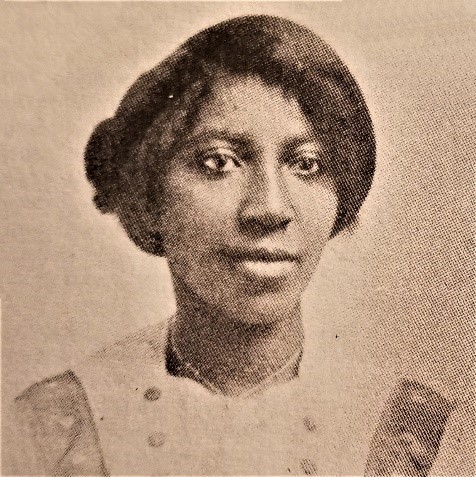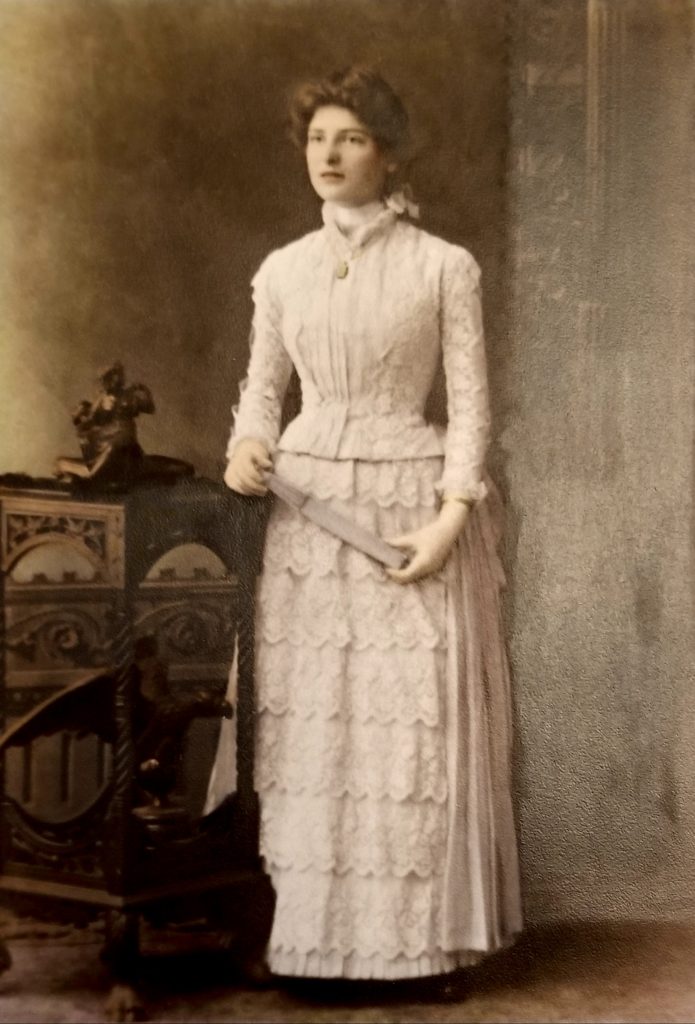

Lula Belle Milburn (1881 – 1955) & Paul Divine (1874 – 1950)
Lula Belle Milburn Divine (Image source, The Johnson City Chronicle 20 April 1930) was prominent social and political figure in Johnson City, notably as a suffragist and founding member of the Johnson City Equal Suffrage League also known as the Johnson City Suffrage Club. She was consistently active (with her father Captain W.E.F. Milburn and husband, Paul E. Divine) and one of the key leaders of the local suffrage movement. She was appointed acting postmaster of Johnson City on October 7, 1922, the first woman to hold the post in Johnson City and one of the first in the state. She also served as president of the Johnson City Business and Professional Woman’s Club after suffrage was achieved. Other groups she served with were the Monday Club, Merry Wives Club, and the Johnson City Book Club. Many prominent citizens, including Senator B. Carroll Reece served as pallbearers during her funeral.

Mary Hardy Milburn (1869 – 1938) & William Elbert Franklin Milburn (1844 – 1925)
This husband and wife team were ardent supporters of woman suffrage locally and had an impact on a state level as well. Mary Winifred Hardy Milburn, the second wife of Captain W.E.F. Milburn (Image courtesy L. Thomas Roberts), the first treasurer at Mountain Home, hailed from Wilson, North Carolina. When she moved to Johnson City in 1899, she and her sister Addie launched and operated Miss Hardy’s Millinery Store (opened March 27, 1899) at 237 and then 249 East Main Street. Mary was a founding member of the Johnson City Equal Suffrage League, serving as the corresponding secretary and assumed the role of president, September 1915 of the inaugural year when Margaret Hayes Powell moved back to Nashville. She was to have attended along with Eliza Shaut White, a banquet by the Knoxville Political Equality League honoring Alice Paul who was in attendance (February 1916), but was replaced by Kathrina Stivers Brading at the last minute. Mary and Grace Armbrust were the contacts responsible for coordinating the suffrage parade through downtown Johnson City on October 7, 1916. At the February 15, 1917 Congressional Union’s Tennessee State convention held in Johnson City, she and White were selected to serve as vice presidents for the First District under Lizzie Crozier French’s term as president. Her husband, Captain Milburn gave one of the toasts during the evening banquet held at the Franklin Hotel. He also gave numerous speeches during the movement and wrote a defense of woman suffrage published statewide in response to an editorial against suffrage titled “Women in Public Life” by Bishop E.E. Hoss.
Ida Florence Potter Harris (1853 – 1936)
Ida Florence Potter Harris, one of city’s outstanding social, civic, and religious leaders was a native of Rockford, Illinois prior to Johnson City with her husband, William Pond Harris in 1890. The Harris’ started Harris Manufacturing which transformed from a small lumber and supply company into a leader of hardwood flooring that helped bring other industry to the area. Mrs. Harris served as vice president for the company in addition to her involvement with many civic and social endeavors. She was a charter member and first president of the Monday Club which was integral in the development of a public library in Johnson City as well as development of the Johnson City Equal Suffrage League, many of the members holding offices in both organizations.

Mildred Crystal Smith (1879 – 1944)
Mildred Crystal Smith (Image source, ETSU Reece Museum), a socially connected suffragist and civic volunteer originally from Des Moines, Iowa, was a member of the Johnson City Equal Suffrage League, the local affiliate to the Congressional Union for Woman Suffrage (CU) and a close friend of Eliza Shaut White. She was a member of the Johnson City Country Club, winning the vice-president’s cup in a golf tournament with over 60 players held at the club in October 1914 and served as treasurer of the Woman’s Auxiliary of Memorial Hospital and chairman of the saleswomen for the Liberty Bond fundraisers. During her time working with Eliza Shaut White in the suffrage club, hospital auxiliary and Liberty Bond drives, they became lifelong friends, traveling together at times after both left Johnson City. Both ladies were also responsible for booking and programming fundraising entertainment (such as MacDonald’s Highland Band) held at the Capitol Theater.

Alpha Leona Richardson Sells (1881 – 1962)
Alpha Leona Richardson Sells (Image source, ETSU Reece Museum), a native of Church Hill, Tennessee, was a suffragist, Bible leader and teacher active in supporting her community. She joined the Johnson City Suffrage Club in 1915 after the club was formed, giving them even more access to her brother-in-law, Congressman Samuel R. Sells, a proponent of women’s suffrage. She was active with group through passage of the 19th Amendment.
She was educated at Washington College, Martha Washington College and Sullins Academy. She and her husband, George Sells came to Johnson City in 1907 and stayed until their deaths. She served on the board of the Mayne Williams Library, was active with the Monday Club and Merry Wives Club and taught the Navigators class at Calvary Presbyterian Church.

Mary Eliza Shaut White (1883 – 1965)
Mary Eliza Shaut White (Image courtesy Stacey White Ferren), a native of Towanda, Pennsylvania, was a socially and politically connected suffragist and civic leader in Johnson City involved with the Woman Suffrage Movement from the time the Johnson City Equal Suffrage League formed early in 1915 through the passage of the 19th Amendment.
She was chosen to represent the club, an affiliate of the Congressional Union for Woman Suffrage (CU) at their December 1915 convention in Washington DC and was elected as Chairman of the Tennessee State Branch in April 1916. In 1917, the Woman’s Party and the CUWS merged to form the National Woman’s Party (NWP) and Mrs. White was selected as the NWP Tennessee State Chairman for 1918 and served as the First District Chairman in 1917, 1919 and 1920.
During her time as a suffragist, she traveled to state and national conventions and worked with many of the key leaders of the movement such as, Alice Paul, Sue Sheldon White, and Lizzie Crozier French. Under her leadership, Johnson City held a suffrage parade in 1916 and hosted the first state convention of 1917 on February 15 at the Elks Club at 113 Spring Street where she presided over the business session. In the evening, the convention moved to the Franklin Hotel for a banquet with over 100 in attendance.
She used her influence and connections to rally support for the 19th Amendment by lobbying local decision makers and state legislators. She was in Nashville with Catherine Flanagan, a state and national organizer for the NWP, for the climactic moment when Tennessee became the 36th state to approve the amendment.

Margaret Hayes Powell (1889 – 1970)
Margaret Hayes Powell (Image source, ETSU Reece Museum), born in Hayesland, Tennessee was a prominent suffragist, public servant, socialite, and a founding member and first president of the Johnson City Equal Suffrage League. She left Johnson City in October 1915 for Nashville and quickly became a key player in the suffrage movement from that city. She served as the Congressional Union’s State vice president for Nashville in 1916 and 1917 but came back to Johnson City for good about 1920.
She was a member of the Tennessee State Board of Education for 24 years (1934-1959), serving under four governors. In recognition of that service, ETSU named Margaret Hayes Powell Hall after her. Mrs. Powell served as president of the Tennessee Diocesan (Episcopal) Women’s Auxiliary from 1943-1945; was a member of the Tennessee State Public Health Council, Tennessee Democratic Executive Committee for the 1st District and presidential elector (1944), and the President’s Committee on Armed Forces, appointed by President Truman.
She was also active in many civic organizations: serving as president of the 1st District, Tennessee Council of Parents and Teachers, the Tennessee Federation of Women’s Clubs, and on several occasions the Monday Club. Mrs. Powell was a life trustee of Mayne Williams Library and was also active with the National Society of Colonial Dames of America, the John Sevier Chapter of the DAR, the Ladies Hermitage Association, and the Johnson City Bridge Club. Her daughter Hortense married former Tennessee governor, Prentiss Cooper in 1950. Currently, her grandson Jim Cooper is the U.S. Congressman for Nashville, Cheatham and Dickson Counties and grandson John Cooper serves as the Mayor of Nashville.

Bertha Brewer Ellis (1892 – 1947)
Bertha Brewer Ellis (Image source, History of Washington County, Tennessee & The Johnson City Press Chronicle 02 July 1947), a native of Johnson City, was a community leader in educational, civic, and cultural activities. A product of the Johnson City segregated school system, she excelled in her class work as an Honor Roll student at Langston. A graduate of A&I State College, she started her education career in 1910-1911 teaching first and second grades at Langston. In June 1924 she was appointed to Douglas grammar school, assuming the duties as principal in 1930. Douglas grammarschool was founded in 1922 with three faculty positions, the principal, and two teachers. As a teacher and mentor, she emphasized hard work and self-reliance and was an inspiration to generations of young girls through her work with the Girl Scouts and as a Brownie Scout leader. One of her exceptional educational achievements was the institution of the Douglas Banking System in 1928, which encouraged students to start and nurture a savings account. Her goal was to promote thrift and “to train the boys and girls to help themselves.” The success of this program was lauded in the press on several occasions over the years.

Her community work included serving as captain of the Court of Calanthe (an early African American women’s benevolent organization affiliated with the Knights of Pythias) war bond campaign, fundraising during two world wars, and participation in each Red Cross and Community Chest campaign. She served as president of the Johnson City Colored Teachers Association, secretary of the Johnson City Library Association, member of the Interracial Girl Scout Council, and Sunday school superintendent for St. Paul A.M.E. Zion Church.
Currently, no primary source documentation of suffrage activities in Johnson City’s Black community has been unearthed. However, it is well documented that Black women clubs, societies, and church groups became a substantial force during this time in our history, giving Black women access to political power. These groups also focused on many other social issues than white suffragists, stepping in to assist their own communities when the need arose. Considering her leadership and involvement in her community, it is difficult to believe that Miss Ellis would not have played a similar role in the suffrage movement locally.

Kathrina Stivers Brading (1868 – 1938)
Kathrina Stivers Brading (Image courtesy of Anne Brading), one of Johnson City’s best known social, civic, and church leaders from Pomeroy, Ohio, moved to Chattanooga early in life and remained there until 1889 when she moved with her husband, James Edward Brading to Johnson City. She was a founding member of the Johnson City Equal Suffrage League and gave the speech “The New Vision of Service Which has Come to Woman” at one of the early meetings, in 1915, the inaugural year of the organization. In February 1916, she traveled with Eliza Shaut White to Knoxville to attend the Knoxville Political Equality League banquet honoring Alice Paul. She was also a charter member and past regent of the John Sevier chapter of the DAR, was an active member of First Presbyterian Church and stayed closely connected to social welfare work throughout her life.

